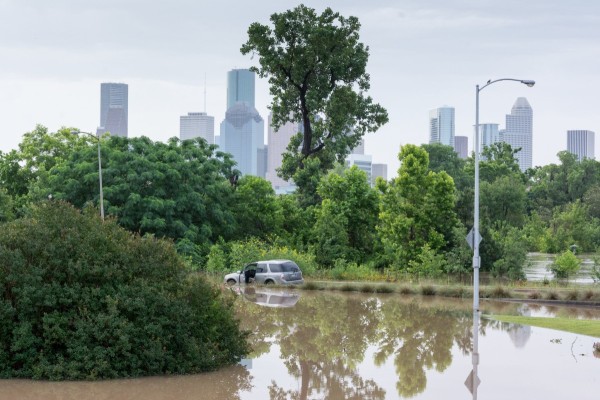Joe Biden and the new climate denialism

US presidential candidate Joe Biden speaks at an event with voters in the gymnasium at McKinley Elementary School in Des Moines, Iowa, January 4, 2020. Photo by Phil Roeder/Flickr.
The climate change debate has shifted. For years, climate denial was just that: people who didn’t believe the science which decisively showed human activity was warming the planet. But as wildfires grow in intensity, hurricanes become stronger and more frequent, and melting permafrost wreaks havoc in the north, that position has become untenable. In its place has arisen a new form of climate denialism.
Instead of outright objection to the reality of climate change, those who seek to maintain the status quo now state their belief in the science and lay out actions that make it seem like they are committed to solving the problem. Oil companies, for example, come out in favour of carbon pricing, even as their emissions continue to rise. Governments declare climate emergencies, but fail to follow through with policies commensurate with the scale or urgency of the crisis.
Seth Klein, author of A Good War: Mobilizing Canada for the Climate Emergency, calls this the new climate denialism. This phenomenon sees key figures in industry, politics, and media acknowledge the threat of climate change, but “promote and practice a politics and policy agenda that fails to align with what the scientific consensus says we must do.” That’s not only a problem in itself, it’s getting in the way of taking the real action that’s necessary to combat the crisis.
In Canada, Prime Minister Justin Trudeau’s climate policy is defined by this new denialism. Trudeau was praised for taking climate change seriously upon coming to office in 2015. He immediately jetted off to the Paris Conference where he pushed for targets to acknowledge 1.5ºC as the goal to limit warming, replacing the previous 2ºC target. However, after he returned home, that milestone proved to be little more than an effective way to greenwash his government’s inadequate environmental policy agenda.
Trudeau’s Liberals kept the emissions-reduction targets set by Stephen Harper’s Conservative government—ones they previously criticized as inadequate—and didn’t even implement a policy agenda that would meet them. They later nationalized the uneconomic Trans Mountain pipeline to ensure it would get built, and approved a massive liquid-natural-gas project in British Columbia. These are not the actions of a government that truly believes we are in a climate emergency, nor one that is committed to doing its part to keep warming below 1.5ºC.
One of the arguments used to justify Trudeau’s approach has been the administration south of the border. President Donald Trump notably called climate change a Chinese hoax and went on to roll back environmental regulations throughout his term. In a sense, he illustrates the dying older form of denialism. The November election has been framed by many to be the climate election: if Trump wins, we’re doomed to much higher warming than we might otherwise experience. Yet that seems to assume that the Democratic candidate, Joe Biden, will take the action that’s necessary to avoid catastrophe. Regrettably, his policies and statements do not support that belief.
Barack Obama and Joe Biden speak with CEO of Namaste Solar Electric, Inc., Blake Jones, while looking at solar panels at the Denver Museum of Nature and Science in Denver, Colorado, February 17, 2009. Official White House Photo by Pete Souza/Flickr.
Biden’s inadequate climate policy
If Biden does win the presidency in November, he already comes to the White House with an established record on climate policy. Given that he was Vice President in Barack Obama’s administration, he cannot be separated from the policies that were taken under those eight years in office. Obama did sign the Paris Agreement, an achievement Biden often brings up when presented with the question of climate change, but he also oversaw the fracking boom and a corresponding surge in US oil production.
In a 2018 clip that is often circulated when these question arise, Obama tells an audience at Rice University, “That whole, suddenly America’s like the biggest oil producer … that was me, people.” In a sense, Obama might be seen as a forerunner of the new denialism that’s gained steam among liberals and even some conservatives. He would almost always say the right things on climate change, and even pass some policies that looked like they were moving the country in the right direction, all while expanding oil production and, near the end of his term, approving new drilling in Alaska’s National Petroleum Reserve for the first time in fifteen years.
These inconsistencies are being carried into Biden’s presidential run. Even as he campaigns on the line that he believes in climate science and will listen to the experts, he has doubled down on his pledge not to ban fracking—which, if it’s not completely obvious, contradicts that promise. Instead of taking the climate crisis seriously, Biden appears to be laundering the new denialism into yet another era of liberal politics.
In recent years, the progressive wing of the Democratic Party has been pushing for a Green New Deal (GND) to not only tackle the climate crisis, but also the ballooning social inequities gripping American society. The GND served as the centrepiece of Bernie Sanders’ run for the Democratic nomination, with a $16.3 trillion price tag to transform the country over a ten-year period (in line with what scientists have said is necessary). Yet Biden has declared he does not support the GND, and has instead been pushing his $2 trillion “Biden Plan” that leaves much to be desired.
When discussing his vision to address global warming, Biden talks a lot about housing retrofits, electric vehicles, and highways lined with vehicle charging stations—despite the fact cities of the future will need to be much denser and far less oriented around automobiles, even if they’re electric.
Biden has also pledged that the US will hit net-zero emissions by 2050, but hasn’t committed to an emissions-reduction target for 2030. Climate reporter Kate Aronoff criticized the plan for being far too focused on promoting green factory work, while paying little attention to low-carbon care work that will be key to a sustainable future, and approaching climate action through the lens of increasing global economic competition with China. Aronoff also pointed out that despite his support for renewables, Biden will not set a date for when the US will get off fossil fuels.
The Biden Plan does not measure up to the scale of action that is necessary to avoid the worst impacts of the climate crisis, even after being pushed to be more ambitious by progressive activists. Given the US has been dragging its feet for decades despite contributing most to the problem, it needs to do far more on climate change than Biden has committed to. Yet, even those policies may struggle to reach implementation given his strong tendency towards bipartisanship.
The doomed desire for bipartisanship
When Obama took office in 2009, the Democrats also had control of Congress, with majorities in the House and the Senate. But instead of seizing that power to push through an ambitious agenda, he wanted to heal the division of the Bush years and reach across the aisle. Unfortunately for Obama, and for the people who voted for him, the Republicans don’t care about liberal respectability politics. Say what you will about their policies, the Republican leadership know how to advance their agenda—and they will seize every opportunity to do it.
Obama’s push for bipartisanship led him to squander much of the two years he held the congressional majority, including dropping the public option from the Affordable Care Act, which Biden now promises he will implement over a decade later. But rather than learning from that experience during Obama’s eight-year stint in the White House, Biden still wants to hold out an olive branch to those who should be his ideological enemies.
At times, the Biden campaign seems more interested in appealing to Republicans than the Democrats’ own voting base, even going so far as to vet Republicans for key positions in a future Biden administration. Meanwhile, due to President Trump’s sinking poll numbers, some pollsters believe the Democrats even have a chance to win back the Senate, which would once again give them control of both houses of Congress.
It should go without saying that any ambitious plan to address the climate crisis and challenge the future profits of the oil industry will not make it past the Republicans—some of the more conservative Democrats may even be opposed. Thus, if Biden feels so strongly about bipartisanship and working with Republicans, his desire for climate action, as inadequate as it already is, will be dead on arrival. Biden isn’t just shooting himself in the foot, he’s threatening the futures of millions, if not billions of people around the world.
Young protesters at the Global Climate Strike in Washington, DC, September 23, 2019. Photo by Ted Eytan/Flickr.
Fighting the new denialism
The stakes of the climate crisis are probably higher than any challenge humanity has yet faced. This emergency requires an ambitious response that is not only focused on what happens within one country’s borders, but considers the global impact of our actions while ensuring rising living standards in poorer parts of the world. This means shifting away from the extractive, polluting activities that have been essential to industrial development.
The new denialism taking hold in the US, Canada, and many other countries uses skilful rhetoric to greenwash insufficient policy responses to the crisis we face, and it is very clear why that happens. Liberal politicians and corporate leaders tell us that with the right incentives and the right pricing mechanisms, the market will respond adequately to quell the emergency, yet after decades of making this promise, it’s not happening at nearly the scale that is necessary.
The climate crisis doesn’t just threaten certain capitalist industries; it calls into questions the very foundations of a system dependent on infinite growth. Building sustainable communities will require us to upend many aspects of capitalist society, not only by embracing a less rapacious way of life, but by shifting our priorities away from competition and profit-making towards care and cooperation.
As Biden seems poised to move into a dominant position in the race for president, progressives and socialists who vote for him in order to prevent Trump from returning to office can’t become complacent like they did after Obama’s victory in 2008. The only way to push the administration to take the kind of climate action necessary to avoid the worst warming scenarios will require an organizational effort not seen in the US in many decades, with stronger unions and organizing that can make demands Biden and his centrist allies cannot ignore.
The GND may not be perfect, but it is a framework that movements have been able to influence and will continue to shape. It also harkens back to the original New Deal, signed by President Franklin D. Roosevelt in 1933. That initiative was not just a set of programs implemented by a benevolent leader; without the power of organized labour and radical social movements, it’s unlikely the government would have taken such ambitious action.
As the US faces unprecedented economic, social, and environmental crisis, that power will need to be built once again, and this time to go beyond simply saving capitalism.
Paris Marx is a socialist writer and host of the Tech Won’t Save Us podcast. Follow Paris on Twitter @parismarx.










